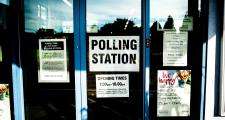Our role in ensuring marginalised voters are heard

A new guide aimed at helping social workers support adults with learning disabilities with their voting rights has been published by BASW.
The Promote the Vote Practice Guide comes in the wake of international studies showing a bias in political participation towards privileged social groups.
Promote the Vote is described as “a call to action” across social care and social work to uphold rights-based practice under UN CRPD Article 29 - the Right to Participate in Political and Public Life.
It is based on the experience of social workers in Bradford who successfully informed people with learning disabilities of their voting rights and achieved an improved turnout at the 2017 general election.
Matthew Urwin, a social worker from the Bradford learning disability service, said: “A lot of the work takes place around election time, both local and general elections, but our work is ongoing throughout the year to keep the agenda in people's minds.
"We work with user-led organisations to make sure people know about their right to register to vote, how to get support if needed to vote in person, and issues around voter ID.
"We draw on local expertise, and organisations help produce material we can use, and also on an individual level where people use their skills to be key parts of the campaign.
"We also work during local elections to train election staff on the reasonable adjustments allowed at polling stations so people don't just get turned away.
"And we work with social care providers, going into supported living and care homes to check whether they have a policy on voting, and that they train staff on voting rights and support people to vote, in their actual support plans.”
The BASW practice guide covers the meaning and the value of voting and contains feedback and good practice advice from social workers.
Its two core aims are:
- To support people with social care needs to understand that they have the right to vote and to participate in local and national elections
- To support people who want to vote to do so either in person or by other means (postal or proxy) with practical assistance and resources
Luke Geoghegan, head of policy at BASW, said: “The basic principle of 'nothing about us without us' means it is vital that people with a learning disability have their voice heard and get to influence things through voting at the General Election.
“The BASW guide distils practice wisdom gained from experiences and lessons in Bradford and other parts of the country.”
Mark Harvey, director social services at Southend on Sea City Council, added: “If social work and social care can't support and enable people to be citizens and part of civic function then I'm not too sure who else within the state systems can.
"I think it is really core to what social workers do.”
The campaign
The My Vote My Voice website has launched a campaign aimed at people with learning disabilities to get more people who face exclusion aware of their rights.
Social workers and the people they work with can write to their local authority to ask them to join the campaign to make voting more accessible.
Campaign chair Ali Gunn said: “We all know that very few people with learning disabilities vote, and many do not even know they have the right to vote. The My Vote My Voice campaign was set up to tackle this and we have worked with the Electoral Commission over the past year to help improve accessible voting.
“We believe that representation can make a difference to so many people who currently feel our democracy isn’t shaped with them in mind.”
Dr Mark Brookes MBE, advocacy lead at disability campaign network Dimensions, highlighted his own lived experience of voting.
He said: “I myself started late. I came to London when I was 20 or 21, but I didn’t get to vote until I was more like 25 or 26.
“It took me a while to find out how to vote back then.”
Dr Brookes added: “We’ve done some work with the Commission around voter ID, because we knew one of the issues was people being turned away.
“If people have got a Freedom Pass, with a photo, they will be able to take that with them when they vote.”
How social workers can support the right to vote
The Bradford team has the following advice for social workers:
- Work with local user-led organisations to help people understand their voting rights
- Draw on the expertise and experience of local disability groups to produce voting materials
- Train election staff on reasonable adjustments allowed at polling stations
- Check care homes and supported living facilities have voting policies, train staff on voting rights, and include voting support in care plans. Also have direct conversations with residents about voting
- Use easy read resources and materials in different formats like video
- Educate students with special needs on voting and set up mock polling stations
- Support social work students to feel confident promoting rights
- Use social media campaigns to promote voting rights information.
Key deadlines
16 April – deadline for registering to vote
17 April - deadline to register proxy vote or postal vote
24 April - Voter authority certificate deadline
2 May local elections
